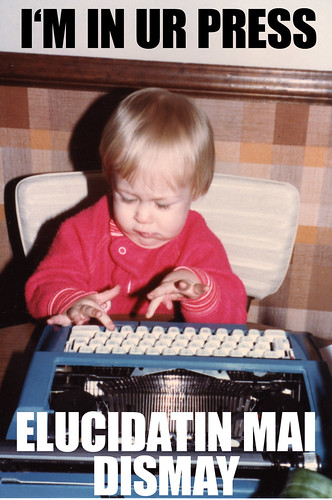
Photo courtesy of The Spacebase via Flickr and Creative Commons
Some final thoughts onWahl-Jorgensen's work on letters-to-the-editor.
There are lengthy sections of the book that focus on the feelings of letters editors towards activists and activist organizations.
Wahl-Jorgensen is exactly right -- activist organizations are indeed composed of individuals. This is an entertaining dichotomy. Letters editors seem particularly concerned with questions of democratic debate and deliberation, something that would imply an interest in civically motivated individuals. But should this civically motivated individual be affiliated with other civically motivated individuals...well, that becomes a problem.
To them, the letters section belongs to "the people," and this elusive entity consists of private individuals, the "average Joe." In their discussions of expression entitlement they distinguish these private individuals from well-organized activists groups who have "an axe to grind." Activist groups consist of private individuals gathered to advance a cause, whereas private individuals often have "an axe to grind." In some ways, this is therefore a spurious distinction to make, but one that springs out of legitimate concerns for allowing everyone entry to the public sphere, regardless of their status and resources (102).
It's not that I am unsympathetic to these claims. In fact, I have had some interesting interactions over the years with people regarding these very debates (another story for another time). I share the conviction that the form letter is not the answer. I understand it is unlikely to be published. I also know that anything composed by the central office of an activist organization will never be as powerful as someone telling their own stories. And I believe, in my heart, that anyone who is crafting those form letters and trying to get them published thinks the same thing.
However, There is a middle road here. Activist organizations are not often composed of well-heeled individuals. Their memberships reflects the very "private citizen" that letters editors so despareately seek. An effective activist campaign that is incorporating letters-to-the-editor as a tactic to elevate their issue in communities will do everything they can to get activists to put these stories into their own words. By rejecting anything that comes from a particular issue group, be it environmental or gun-rights, letters editors are severely limiting the conversation and playing the gatekeeper role that the rest of the paper already plays in covering "the doings of the powerful" (105).

No comments:
Post a Comment